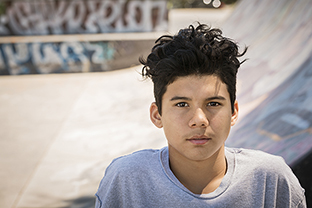
SHOULD AUSTRALIA EXTEND FOSTER CARE TO 21 YEARS?
Friday 26 July
You wouldn’t kick your own kids out of home just because they turned 18 years. Why do it to foster children?
Award-winning author and child advocate, Eleni Hale spent her difficult teenage years in the state foster care system where she learnt very quickly that the odds were against her of ever making a success of her life.
“My time in care was something I had to survive and recover from. I still struggle with it. There was no way to prosper or to properly engage at school as I, like so many others, was constantly moved from home to home. Each time was a new challenge, new people and new dangers but always a sense of being unwanted. From the age of 15 I was reminded that I would be on my own at 18 and this was a frightening prospect. Most kids who leave care have much stacked against them socially, economically and health-wise. When I turned 18 my need to survive forced me to make some bad decisions,” says Eleni.
Sadly, this is not a unique experience. In Australia today there are more than 47,000 children in foster care with the state and territory governments acting ‘in loco parentis’ of these vulnerable children: the majority being under a child protection intervention order1.
Paul McDonald, Chair of the Home Stretch – a coalition of more than 160 organisations advocating for government legislative change to extend foster care to 21 – says that each year around 3000 children exit formal and informal foster care with disturbing results.
“Within a year, around half will be unemployed, homeless, pregnant, or in jail. The state and territory governments begin transitioning these children out of foster care from the age of just 15. When they turn 18, all support stops. State and territory governments has a statutory responsibility to protect them from harm and give them the best possible start in adult life … but right now we let them down just when they hit the home stretch.”
The US, UK, Canada and New Zealand have extended out-of-home care to 21. What about Australia? Eleni and Paul will be part of the Home Stretch Symposium in Sydney this week (27 & 28 August) – along with Australian government representatives as well as international and local child welfare experts – to discuss joining this global change.
“Australia needs to catch up. Most young people are now continuing to live with their parents well into their mid- 20s2. Foster kids don’t have that support. Governments are failing them before the ‘parental’ job is done. It is not only cruel, it costs the nation financially,” says Paul.
The Home Stretch campaign is backed by research that shows that for every $1 invested in extending foster care to 21 years, society benefits by more than $2 in: reduced crime, reduced mental health care, reduced drug and alcohol dependency, reduced hospitalisations, reduced homelessness and increased further education for foster children.
“Extending foster care to 21 is better for them and better for society. It’s an investment, not a cost. It would save governments $2.4 billion over 10 years. More importantly, it would give thousands of foster children hope for a brighter start in life.”
Eleni was one of the “lucky ones”. She overcame the odds to become educated, employed, start a family of her own and is the author of the award-winning fictional novel Stone Girl, inspired by her own experiences in foster care.
“I have been there. I have lived it. I know that three more years of support will give foster children a fighting chance for a better future. There needs to be a change. Please Australia … make it 21,” urges Eleni.
Contact Jodie Harrison on 0425 754 370
